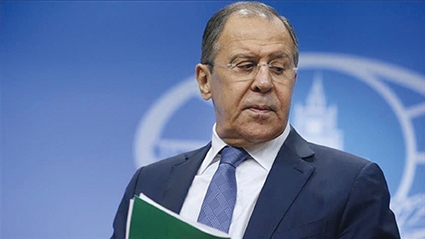What Are Moscow's Preconditions for Abolishing a Ban on Flights with Georgia?
Russian Foreign Minister Sergey Lavrov says there is a possibility that Moscow will reconsider its ban on flights with Georgia if Tbilisi stabilizes the situation in the country and ensures the safety of Russian citizens.
In an interview with Russian media outlet Argumenti i Fakti, Lavrov said Moscow expects the Georgian government to realize the "danger and ineffectiveness of continuing to fuel the anti-Russian hysteria" as soon as possible, he said, referring to anti-Russian and anti-occupation rallies underway in Georgia since June 20.
“We cannot help but remain concerned about the attempts of several radically-minded members of the Georgian political elite to foster Russophobic sentiments and to drive a wedge between our peoples," Lavrov said, adding that these people “cannot even realize their actions and the damage that they inflict on their own country, on the well-being of their people, which to a significant extent depends on the quality of economic and humanitarian ties with Russia."
The politician added that certain Georgian politicians are trying to outclass each other in anti-Russian rhetoric to achieve their “selfish goals.”
Lavrov underlined it is important that Official Tbilisi find the strength to condemn the “shameful act by a local TV station, which aired assaults aimed at the President of Russia, resulting in an outcry in Georgian society itself." Here, he referred to private TV station Rustavi 2 whose TV anchor Giorgi Gabunia verbally assaulted President Putin during his live show earlier this month.
“We hope that the Georgian authorities will be able to stabilize the socio-political situation in the country and eliminate the existing threats to the security of Russians. If this happens, the necessary conditions will be created to consider the possibility of abolishing the precautionary measures taken by Russia, including the ban on air transportation to Georgia. We want to be friends and cooperate for the benefit of the citizens of Russia and Georgia.”
Earlier this month, Lavrov also said Moscow suspects that Washington is trying to inhibit Russia and Georgia from normalizing their ties.
Georgian journalists asked the founder and Chair of the ruling Georgian Dream (GD) party, Bidzina Ivanishvili to comment on Lavrov’s statements.
“What happened in Rustavi 2 is a shame not only for that TV company but for our whole country and our culture and identity… Of course I condemn Gabunia’s action and it was judged by the whole of Georgian society,” Ivanishvili said. He did not comment on Lavrov’s other statements.
A number of Georgian opposition parties claim the ruling party and Kremlin have a similar narrative in demanding a proper response to Rustavi 2 and stabilizing the socio-political situation in Georgia. Khatia Dekanoidze, member of the United National Movement, which is often linked with Rustavi 2, says that Moscow directly tasked Georgia to attack the pro-western opposition and silence TV station Rustavi 2.
“Lavrov’s statements see an interference in the domestic affairs of Georgia. The government should give him a proper response,” she said.
Opposition European Georgia also believes that Lavrov’s statements are synchronized with the Georgian government’s comments.
“For both the Georgian government and Moscow, it is important to silence all free channels where Georgian society freely expresses its position. Their position is also similar regarding Rustavi 2,” party MP Zurab Chiaberashvili said.
Head of the National-Democratic party in Georgia, Bachuki Kardava, says the Kremlin’s target at present is Rustavi 2, pro-western opposition and anti-occupation rally participants of Georgian society.
“Lavrov believes his ally in Georgia is Ivanishvili and his government. The authorities have become the puppets of the Kremlin,” Kardava stressed.
Large-scale anti-Russian protests were launched in Tbilisi on June 20 on the visit of Russian parliamentarians. The demonstrations were sparked by a session of the General Assembly of the International Assembly on Orthodoxy (IAO). Following the approved protocol, Head of the Russian delegation, State Duma MP Sergey Gavrilov, who is the IAO president, took the Speaker’s seat in the Georgian parliament. Outraged by this action, the Georgian opposition disrupted the event and outside protests ended in an attempt to break into the parliament building. The Russian MPs had to leave the country and the assembly was wrapped up.
On June 21, 2019, Russian President Vladimir Putin signed a decree banning Russian airlines from flying to Georgia which took effect on July 8.
By Thea Morrison
Image source: nationalturk.com












